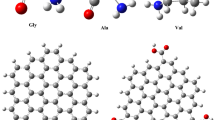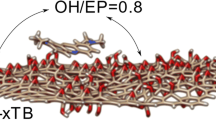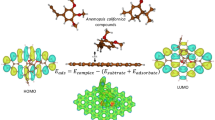Abstract
Small aromatic molecules are precursors for several biological systems such as DNA, proteins, drugs, and are also present in several pollutants. The understanding of the interaction of these small aromatic molecules with pristine and functionalised graphene (fGr) can generate different applications. We performed ab initio simulations based on the density functional theory to evaluate the interaction between the aromatic compounds, benzene, benzoic acid, aniline and phenol, with pristine and fGr. The results show that the binding energy for all cases is less than 103.24 kJ/mol (1.07 eV) without substantial modification of the electronic properties, indicating that the interaction occurs through a physical adsorption regime. The results are promising because they suggest that pristine graphene and functionalised graphene are suitable for removing these pollutants, or for carrying molecules for biological applications influenced by π-π and H-bonds interaction.



Similar content being viewed by others
Availability of data and material
N/A
Code availability
N/A
References
Rao CNR, Sood AK, Subrahmanyam KS, Govindaraj A (2009) Graphene: the new two-dimensional nanomaterial. Angew Chem Int Ed 48:7752–7777. https://doi.org/10.1002/anie.200901678
Castro Neto AH, Guinea F, Peres NMR et al (2009) The electronic properties of graphene. Rev Mod Phys 81:109–162. https://doi.org/10.1103/RevModPhys.81.109
Berman D, Deshmukh SA, Sankaranarayanan SKRS et al (2015) Macroscale superlubricity enabled by graphene nanoscroll formation. Science 348:1118–1122. https://doi.org/10.1126/science.1262024
Gan T, Hu S (2011) Electrochemical sensors based on graphene materials. Microchim Acta 175:1–19. https://doi.org/10.1007/s00604-011-0639-7
Miller JR, Outlaw RA, Holloway BC (2010) Graphene double-layer capacitor with ac line-filtering performance. Science 329:1637–1639. https://doi.org/10.1126/science.1194372
Ohta T (2006) Controlling the electronic structure of bilayer graphene. Science 313:951–954. https://doi.org/10.1126/science.1130681
Zhong Y, Zhen Z, Zhu H (2017) Graphene: fundamental research and potential applications. FlatChem 4:20–32. https://doi.org/10.1016/j.flatc.2017.06.008
Son Y-W, Cohen ML, Louie SG (2006) Half-metallic graphene nanoribbons. Nature 444:347–349. https://doi.org/10.1038/nature05180
Szczęśniak B, Choma J, Jaroniec M (2017) Gas adsorption properties of graphene-based materials. Adv Colloid Interf Sci 243:46–59. https://doi.org/10.1016/j.cis.2017.03.007
Mao HY, Laurent S, Chen W et al (2013) Graphene: promises, facts, opportunities, and challenges in nanomedicine. Chem Rev 113:3407–3424. https://doi.org/10.1021/cr300335p
Muazim K, Hussain Z (2017) Graphene oxide—a platform towards theranostics. Mater Sci Eng C 76:1274–1288. https://doi.org/10.1016/j.msec.2017.02.121
Nanda SS, Papaefthymiou GC, Yi DK (2015) Functionalization of graphene oxide and its biomedical applications. Critical Reviews in Solid State and Materials Sciences 40:291–315. https://doi.org/10.1080/10408436.2014.1002604
Sasidharan A, Panchakarla LS, Chandran P et al (2011) Differential nano-bio interactions and toxicity effects of pristine versus functionalized graphene. Nanoscale 3:2461. https://doi.org/10.1039/c1nr10172b
Gao W, Majumder M, Alemany LB et al (2011) Engineered graphite oxide materials for application in water purification. ACS Appl Mater Interfaces 3:1821–1826. https://doi.org/10.1021/am200300u
Haubner K, Murawski J, Olk P et al (2010) The route to functional graphene oxide. ChemPhysChem 11:2131–2139. https://doi.org/10.1002/cphc.201000132
Xu J, Wang L, Zhu Y (2012) Decontamination of bisphenol a from aqueous solution by graphene adsorption. Langmuir 28:8418–8425. https://doi.org/10.1021/la301476p
Yu Y, Murthy BN, Shapter JG et al (2013) Benzene carboxylic acid derivatized graphene oxide nanosheets on natural zeolites as effective adsorbents for cationic dye removal. J Hazard Mater 260:330–338. https://doi.org/10.1016/j.jhazmat.2013.05.041
Liu S, Zeng TH, Hofmann M et al (2011) Antibacterial activity of graphite, graphite oxide, graphene oxide, and reduced graphene oxide: membrane and oxidative stress. ACS Nano 5:6971–6980. https://doi.org/10.1021/nn202451x
Yu S, Wang X, Ai Y et al (2016) Experimental and theoretical studies on competitive adsorption of aromatic compounds on reduced graphene oxides. J Mater Chem A 4:5654–5662. https://doi.org/10.1039/C6TA00890A
Lewis SE, Silburn DM, Kookana RS, Shaw M (2016) Pesticide behavior, fate, and effects in the tropics: an overview of the current state of knowledge. J Agric Food Chem. https://doi.org/10.1021/acs.jafc.6b01320
Connellan SJ (2017) Lung diseases associated with hydrocarbon exposure. Respir Med 126:46–51. https://doi.org/10.1016/j.rmed.2017.03.021
Kumar V, Kim K-H, Park J-W et al (2017) Graphene and its nanocomposites as a platform for environmental applications. Chem Eng J 315:210–232. https://doi.org/10.1016/j.cej.2017.01.008
Nupearachchi CN, Mahatantila K, Vithanage M (2017) Application of graphene for decontamination of water; implications for sorptive removal. Groundwater for Sustainable Development. https://doi.org/10.1016/j.gsd.2017.06.006
Chandra V, Kim KS (2011) Highly selective adsorption of Hg2+ by a polypyrrole–reduced graphene oxide composite. Chem Commun 47:3942. https://doi.org/10.1039/c1cc00005e
Jauris IM, Matos CF, Saucier C et al (2016) Adsorption of sodium diclofenac on graphene: a combined experimental and theoretical study. Phys Chem Chem Phys 18:1526–1536. https://doi.org/10.1039/C5CP05940B
Yang K, Wu W, Jing Q, Zhu L (2008) Aqueous adsorption of aniline, phenol, and their substitutes by multi-walled carbon nanotubes. Environ Sci Technol 42:7931–7936. https://doi.org/10.1021/es801463v
Ren X, Chen C, Nagatsu M, Wang X (2011) Carbon nanotubes as adsorbents in environmental pollution management: a review. Chem Eng J 170:395–410. https://doi.org/10.1016/j.cej.2010.08.045
Cohen-Tanugi D, Grossman JC (2014) Mechanical strength of nanoporous graphene as a desalination membrane. Nano Lett 14:6171–6178. https://doi.org/10.1021/nl502399y
Surwade SP, Smirnov SN, Vlassiouk IV et al (2015) Water desalination using nanoporous single-layer graphene. Nature Nanotech 10:459–464. https://doi.org/10.1038/nnano.2015.37
Devanathan R, Chase-Woods D, Shin Y, Gotthold DW (2016) Molecular dynamics simulations reveal that water diffusion between graphene oxide layers is slow. Sci Rep 6:29484. https://doi.org/10.1038/srep29484
Nicolaï A, Sumpter BG, Meunier V (2014) Tunable water desalination across graphene oxide framework membranes. Phys Chem Chem Phys 16:8646. https://doi.org/10.1039/c4cp01051e
Lin L-C, Grossman JC (2015) Atomistic understandings of reduced graphene oxide as an ultrathin-film nanoporous membrane for separations. Nat Commun 6:8335. https://doi.org/10.1038/ncomms9335
Ma J, Ping D, Dong X (2017) Recent developments of graphene oxide-based membranes: a review. Membranes 7:52. https://doi.org/10.3390/membranes7030052
Han Y, Xu Z, Gao C (2013) Ultrathin graphene nanofiltration membrane for water purification. Adv Funct Mater 23:3693–3700. https://doi.org/10.1002/adfm.201202601
Abraham J, Vasu KS, Williams CD et al (2017) Tunable sieving of ions using graphene oxide membranes. Nature Nanotech 12:546–550. https://doi.org/10.1038/nnano.2017.21
Pedico A, Fontana M, Bianco S et al (2020) Graphene oxide membranes for trace hydrocarbon contaminant removal from aqueous solution. Nanomaterials 10:2242. https://doi.org/10.3390/nano10112242
Kim HW, Yoon HW, Yoon S-M et al (2013) Selective gas transport through few-layered graphene and graphene oxide membranes. Science 342:91–95. https://doi.org/10.1126/science.1236098
Hu R, Dai S, Shao D et al (2015) Efficient removal of phenol and aniline from aqueous solutions using graphene oxide/polypyrrole composites. J Mol Liq 203:80–89. https://doi.org/10.1016/j.molliq.2014.12.046
Dervin S, Dionysiou DD, Pillai SC (2016) 2D nanostructures for water purification: graphene and beyond. Nanoscale 8:15115–15131. https://doi.org/10.1039/C6NR04508A
Qu X, Alvarez PJJ, Li Q (2013) Applications of nanotechnology in water and wastewater treatment. Water Res 47:3931–3946. https://doi.org/10.1016/j.watres.2012.09.058
Wang S, Sun H, Ang HM, Tadé MO (2013) Adsorptive remediation of environmental pollutants using novel graphene-based nanomaterials. Chem Eng J 226:336–347. https://doi.org/10.1016/j.cej.2013.04.070
Wang S, Ng CW, Wang W et al (2012) Synergistic and competitive adsorption of organic dyes on multiwalled carbon nanotubes. Chem Eng J 197:34–40. https://doi.org/10.1016/j.cej.2012.05.008
Wang W, Sun T, Zhang Y, Wang Y-B (2015) Benchmark calculations of the adsorption of aromatic molecules on graphene. J Comput Chem 36:1763–1771. https://doi.org/10.1002/jcc.23994
Zhao Y, Liu J, Wang N et al (2018) Rational selection of small aromatic molecules to functionalize graphene for enhancing capacitive energy storage. J Mater Chem A 6:7566–7572. https://doi.org/10.1039/C8TA00710A
Wu G, Tang X, Meyyappan M, Lai KWC (2017) Doping effects of surface functionalization on graphene with aromatic molecule and organic solvents. Appl Surf Sci 425:713–721. https://doi.org/10.1016/j.apsusc.2017.07.048
Yu L, Gao H, Zhao J et al (2011) Adsorption of aromatic heterocyclic compounds on pristine and defect graphene: a first-principles study. Jnl of Comp & Theo Nano 8:2492–2497. https://doi.org/10.1166/jctn.2011.1985
Kong L, Enders A, Rahman TS, Dowben PA (2014) Molecular adsorption on graphene. J Phys Condens Matter 26:443001. https://doi.org/10.1088/0953-8984/26/44/443001
Petrushenko IK, Tikhonov NI, Petrushenko KB (2020) Graphene-BN-organic nanoflake complexes: DFT, IGM and SAPT0 insights. Diam Relat Mater 107:107905. https://doi.org/10.1016/j.diamond.2020.107905
Soler JM, Artacho E, Gale JD et al (2002) The SIESTA method for ab initio orde-N materials simulation. J Phys Condens Matter 14:2745–2779. https://doi.org/10.1088/0953-8984/14/11/302
Perdew JP, Zunger A (1981) Self-interaction correction to density-functional approximations for many-electron systems. Phys Rev B 23:5048–5079. https://doi.org/10.1103/PhysRevB.23.5048
Jauris IM, Fagan SB, Adebayo MA, Machado FM (2016) Adsorption of acridine orange and methylene blue synthetic dyes and anthracene on single wall carbon nanotubes: a first principle approach. Computational and Theoretical Chemistry 1076:42–50. https://doi.org/10.1016/j.comptc.2015.11.021
de Menezes VM, Michelon E, Rossato J et al (2012) Carbon nanostructures interacting with vitamins A, B3 and C: ab initio simulations. J Biomed Nanotechnol 8:345–349. https://doi.org/10.1166/jbn.2012.1434
Tonel MZ, González-Durruthy M, Zanella I, Fagan SB (2019) Interactions of graphene derivatives with glutamate-neurotransmitter: a parallel first principles - docking investigation. J Mol Graph Model 88:121–127. https://doi.org/10.1016/j.jmgm.2019.01.007
Saini SS, Fagan SB, Tonel MZ (2021) A novel and green extraction strategy for sensitive determination of phthalates in aqueous samples: analytical and computational studies. Microchem J 166:106227. https://doi.org/10.1016/j.microc.2021.106227
de Moraes EE, Tonel MZ, Fagan SB, Barbosa MC (2019) Density functional theory study of π-aromatic interaction of benzene, phenol, catechol, dopamine isolated dimers and adsorbed on graphene surface. J Mol Model 25:302. https://doi.org/10.1007/s00894-019-4185-2
Hernández Rosas JJ, Ramírez Gutiérrez RE, Escobedo-Morales A, Chigo Anota E (2011) First principles calculations of the electronic and chemical properties of graphene, graphane, and graphene oxide. J Mol Model 17:1133–1139. https://doi.org/10.1007/s00894-010-0818-1
Machado FM, Carmalin SA, Lima EC et al (2016) Adsorption of Alizarin Red S dye by carbon nanotubes: an experimental and theoretical investigation. J Phys Chem C 120:18296–18306. https://doi.org/10.1021/acs.jpcc.6b03884
Tournus F, Charlier J-C (2005) Ab initio study of benzene adsorption on carbon nanotubes. Phys Rev B 71. https://doi.org/10.1103/PhysRevB.71.165421
Tournus F, Latil S, Heggie MI, Charlier J-C (2005) π -stacking interaction between carbon nanotubes and organic molecules. Phys Rev B 72. https://doi.org/10.1103/PhysRevB.72.075431
Li B, Ou P, Wei Y et al (2018) Polycyclic aromatic hydrocarbons adsorption onto graphene: a DFT and AIMD study. Materials 11:726. https://doi.org/10.3390/ma11050726
Arrigoni M, Madsen GKH (2019) Comparing the performance of LDA and GGA functionals in predicting the lattice thermal conductivity of III-V semiconductor materials in the zincblende structure: the cases of AlAs and BAs. Comput Mater Sci 156:354–360. https://doi.org/10.1016/j.commatsci.2018.10.005
Cresti A, Lopez-Bezanilla A, Ordejón P, Roche S (2011) Oxygen surface functionalization of graphene nanoribbons for transport gap engineering. ACS Nano 5:9271–9277. https://doi.org/10.1021/nn203573y
Boys SF, Bernardi F (1970) The calculation of small molecular interactions by the differences of separate total energies. Some procedures with reduced errors. Mol Phys 19:553–566. https://doi.org/10.1080/00268977000101561
Tonel MZ, Lara IV, Zanella I, Fagan SB (2017) The influence of the concentration and adsorption sites of different chemical groups on graphene through first principles simulations. Phys Chem Chem Phys 19:27374–27383. https://doi.org/10.1039/C7CP05549H
Dreyer DR, Park S, Bielawski CW, Ruoff RS (2010) The chemistry of graphene oxide. Chem Soc Rev 39:228–240. https://doi.org/10.1039/B917103G
Vecera P, Chacón-Torres JC, Pichler T et al (2017) Precise determination of graphene functionalization by in situ Raman spectroscopy. Nat Commun 8:15192. https://doi.org/10.1038/ncomms15192
Fraga TJM, Carvalho MN, Ghislandi MG, da Motta Sobrinho MA (2019) Functionalized graphene-based materials as innovative adsorbents of organic pollutants: a concise overview. Braz J Chem Eng 36:1–31. https://doi.org/10.1590/0104-6632.20190361s20180283
Wang J, Yu S, Zhao Y et al (2017) Experimental and theoretical studies of ZnO and MgO for the rapid coagulation of graphene oxide from aqueous solutions. Sep Purif Technol 184:88–96. https://doi.org/10.1016/j.seppur.2017.03.058
Georgakilas V, Otyepka M, Bourlinos AB et al (2012) Functionalization of graphene: covalent and non-covalent approaches, derivatives and applications. Chem Rev 112:6156–6214. https://doi.org/10.1021/cr3000412
Wanjeri VWO, Sheppard CJ, Prinsloo ARE et al (2018) Isotherm and kinetic investigations on the adsorption of organophosphorus pesticides on graphene oxide based silica coated magnetic nanoparticles functionalized with 2-phenylethylamine. Journal of Environmental Chemical Engineering 6:1333–1346. https://doi.org/10.1016/j.jece.2018.01.064
Bueno RA, Martínez JI, Luccas RF et al (2017) Highly selective covalent organic functionalization of epitaxial graphene. Nat Commun 8:15306. https://doi.org/10.1038/ncomms15306
Mrlík M, Ilčíková M, Plachý T et al (2016) Graphene oxide reduction during surface-initiated atom transfer radical polymerization of glycidyl methacrylate: controlling electro-responsive properties. Chem Eng J 283:717–720. https://doi.org/10.1016/j.cej.2015.08.013
Begum H, Ahmed MS, Cho S, Jeon S (2017) Simultaneous reduction and nitrogen functionalization of graphene oxide using lemon for metal-free oxygen reduction reaction. J Power Sources 372:116–124. https://doi.org/10.1016/j.jpowsour.2017.10.035
Mahmoodi NM, Ghezelbash M, Shabanian M et al (2017) Efficient removal of cationic dyes from colored wastewaters by dithiocarbamate-functionalized graphene oxide nanosheets: from synthesis to detailed kinetics studies. J Taiwan Inst Chem Eng 81:239–246. https://doi.org/10.1016/j.jtice.2017.10.011
Zan W (2014) Chemical functionalization of graphene by carbene cycloaddition: a density functional theory study. Appl Surf Sci 311:377–383. https://doi.org/10.1016/j.apsusc.2014.05.071
Neaton JB, Hybertsen MS, Louie SG (2006) Renormalization of molecular electronic levels at metal-molecule interfaces. Phys Rev Lett 97:216405. https://doi.org/10.1103/PhysRevLett.97.216405
Giannozzi P, Baroni S, Bonini N et al (2009) QUANTUM ESPRESSO: a modular and open-source software project for quantum simulations of materials. J Phys Condens Matter 21:395502. https://doi.org/10.1088/0953-8984/21/39/395502
Sardari M, Fotooh FK, Nateghi MR (2018) A DFT study of the structural and electronic properties of periodic forms of aniline and pyrrole polymers and aniline–pyrrole copolymer. J Mol Model 24:148. https://doi.org/10.1007/s00894-018-3667-y
AlZahrani AZ (2010) First-principles study on the structural and electronic properties of graphene upon benzene and naphthalene adsorption. Appl Surf Sci 257:807–810. https://doi.org/10.1016/j.apsusc.2010.07.069
Cortés-Arriagada D, Sanhueza L, Santander-Nelli M (2013) Modeling the physisorption of bisphenol A on graphene and graphene oxide. J Mol Model 19:3569–3580. https://doi.org/10.1007/s00894-013-1872-2
Song W, Yang T, Wang X et al (2016) Experimental and theoretical evidence for competitive interactions of tetracycline and sulfamethazine with reduced graphene oxides. Environ Sci: Nano 3:1318–1326. https://doi.org/10.1039/C6EN00306K
Madadi Mahani N, Amiri A, Noroozmahani N (2017) A first principle study on the adsorption of benzoic acid onto the (6, 6) and (5, 5) armchair single-walled carbon nanotubes. Orient J Chem 33:1127–1132. https://doi.org/10.13005/ojc/330309
Delley B (2000) From molecules to solids with the DMol3 approach. J Chem Phys 113:7756–7764. https://doi.org/10.1063/1.1316015
Kotel LY, Brichka AV, SYa B (2009) Adsorption properties of modified multilayer carbon nanotubes with respect to benzoic acid. Russ J Appl Chem 82:569–573. https://doi.org/10.1134/S1070427209040077
Tang H, Zhang S, Huang T et al (2020) pH-dependent adsorption of aromatic compounds on graphene oxide: an experimental, molecular dynamics simulation and density functional theory investigation. J Hazard Mater 395:122680. https://doi.org/10.1016/j.jhazmat.2020.122680
Li X, Pignatello JJ, Wang Y, Xing B (2013) New insight into adsorption mechanism of ionizable compounds on carbon nanotubes. Environ Sci Technol 130710121153005. https://doi.org/10.1021/es4011042
Li X, Gámiz B, Wang Y et al (2015) Competitive sorption used to probe strong hydrogen bonding sites for weak organic acids on carbon nanotubes. Environ Sci Technol 49:1409–1417. https://doi.org/10.1021/es504019u
Ahn D, Park C, Song J (2020) Predicting whether aromatic molecules would prefer to enter a carbon nanotube: a density functional theory study. J Comput Chem 41:1261–1270. https://doi.org/10.1002/jcc.26173
Moradi F, Darvish Ganji M, Sarrafi Y (2018) Remediation of phenol-contaminated water by pristine and functionalized SWCNTs: ab initio van der Waals DFT investigation. Diam Relat Mater 82:7–18. https://doi.org/10.1016/j.diamond.2017.12.014
Hernández JMG, Anota EC, de la Cruz MTR et al (2012) First principles studies of the graphene-phenol interactions. J Mol Model 18:3857–3866. https://doi.org/10.1007/s00894-012-1382-7
Perdew JP, Burke K, Ernzerhof M (1996) Generalized gradient approximation made simple. Phys Rev Lett 77:3865–3868. https://doi.org/10.1103/PhysRevLett.77.3865
Ersan G, Apul OG, Perreault F, Karanfil T (2017) Adsorption of organic contaminants by graphene nanosheets: a review. Water Res 126:385–398. https://doi.org/10.1016/j.watres.2017.08.010
Avila Y, Cocoletzi GH, Romero MT (2014) First principles calculations of phenol adsorption on pristine and group III (B, Al, Ga) doped graphene layers. J Mol Model 20. https://doi.org/10.1007/s00894-014-2112-0
Chen X, Chen B (2015) Macroscopic and spectroscopic investigations of the adsorption of nitroaromatic compounds on graphene oxide, reduced graphene oxide, and graphene nanosheets. Environ Sci Technol 49:6181–6189. https://doi.org/10.1021/es5054946
Acknowledgements
The authors acknowledge CENAPAD-SP (Centro Nacional de Processamento de Alto Desempenho em São Paulo) and UFN (Universidade Franciscana) for computer time and the Brazilian agencies CNPQ and CAPES for financial support.
Funding
This study is funded by Coordenação de Aperfeiçoamento de Pessoal de Nível Superior, CAPES (scholarship).
Author information
Authors and Affiliations
Contributions
Mariana Zancan Tonel contributed to the design of the study, carried out the simulations and wrote the manuscript. Mariana Zancan Tonel, Ivana Zanella and Solange Binotto Fagan analysed the data with constructive discussions. Solange Binotto Fagan supervised the research.
Corresponding author
Ethics declarations
Conflicts of interest
The authors declare that they have no competing interests.
Ethics approval
N/A
Consent to participate
The manuscript is approved by all authors for publication.
Consent for publication
The consent for publication was obtained from all participants.
Additional information
Publisher’s note
Springer Nature remains neutral with regard to jurisdictional claims in published maps and institutional affiliations.
Rights and permissions
About this article
Cite this article
Tonel, M.Z., Zanella, I. & Fagan, S.B. Theoretical study of small aromatic molecules adsorbed in pristine and functionalised graphene. J Mol Model 27, 193 (2021). https://doi.org/10.1007/s00894-021-04806-0
Received:
Accepted:
Published:
DOI: https://doi.org/10.1007/s00894-021-04806-0




